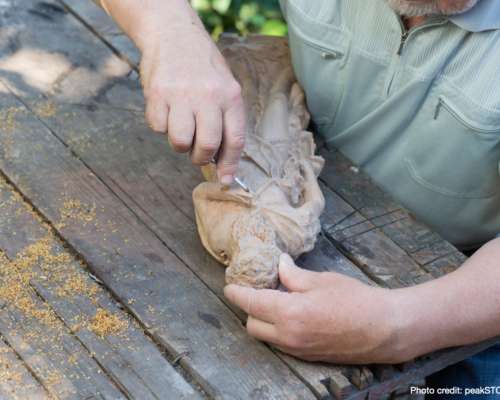American society often has a lot of negative things to say about Christians and Christianity.
You’ll find these negative comments on social media or on the news, and you’ll hear them in conversations on the bus or in the breakroom or at social events.
Christians have many ways of dismissing these negative comments. I know I did.
For example, we’ll dismiss them by saying, “This is an example of how Jesus told us the world would hate us.”
Or, we’ll say, “It’s because they don’t understand why we live or believe this way.”
Or, we think it’s because others are “lost in sin” and therefore “blind” to the truth, but one day they too will “see”.
It’s convenient to dismiss the negative things that others say about Christians and Christianity. It’s certainly more comfortable for us to simply write off critiques and comments as misunderstandings or persecution or gossip.
More comfortable, that is, than asking ourselves if the comments are true.
What is it, that those outside of the Church are saying of us, anyway?
One, that the Church is full of hypocrites. We preach holiness at others while living unholy ourselves. We like to dismiss this one by saying, “No one is perfect but God” and “Churches are like hospitals for the broken”. Which may both be true, but still do not adequately address the condition of judging others for their sins while continuing to live in ours.
Two, that the Church is close-minded and judgmental. We brush this one off with Jesus’ words about the narrow gate. Which again may be true, but neglects other verses which speak of God’s grace and tell us not to judge those outside of the Church. Also, many times the issues we hound on are cultural rather than theological.
Three, that a lot of harm has been done to others in the name of Christianity. This is a truth we try to avoid by removing it from history books, but no amount of white-washing the past will undo the incredible atrocities that have been done in Jesus’ name.
We could talk about the Crusades and the theology of discovery and the slavery of Black people and the genocide of Native American communities, but let’s look at a few more personal examples.
For example, when pastors have used Scripture to force a battered woman to return to her abusive husband.
Or when church leaders convince people that if they give their money to the church they will be “blessed”, but then that money is used to make the leaders more rich and powerful, while the parishioners continue to struggle in poverty.
Or when someone in spiritual authority uses their position to sexually abuse or assault children and/or women in their congregations, and then others in authority cover it up.
Or when, as I discussed in a previous post, the Church – from the pulpit even – tells people who suffer from mental illness that their suffering is a spiritual issue, rather than a physical or mental one, and they merely need to “pray more” or read their Bible.
Or even when Scripture is misused in order to convince people that to disobey the authority of the Church is equal to disobeying God. Or, in extreme cases (like ours), where the Church and politics are so intertwined, that disobeying or disrespecting the authority of a political party is equated to disobeying God.
Unfortunately, all of these things happen way more often than we would like to admit.
Yes, it is true, we are all sinful people. We will make mistakes. However, as Christians, are we not called to a higher standard? The Bible says we are God’s witnesses. We are imitators of Christ. This makes these types of sins so much more grievous, because the things we do represent God to unbelievers.
People who have suffered abuse of any kind at the hands of churches, church leadership, or people who claim to be Christian and to follow Christ, are more likely to have confusing and distorted images of God, if they even still believe in Him. How can you reconcile, for example, a God of love and goodness with a life full of abuse?
Church teachings that historically have supported and exploited a toxic patriarchal model* with women in a subservient role have fed into the violence and abuse that has come from the hands of the Church. And the misuse of what most people believe to be a proverb, “spare the rod, spoil the child” has caused irreparable damage to children for generations.
This type of historical spiritual trauma can be incredibly dangerous and difficult to break.
I do not believe God intended for Scripture to be used as a means of controlling, manipulating, or intimidating others. I do not believe God condones the use of Scripture to justify harming or killing others.
When religion is used as a tool to hurt**, it is no longer about faith. It is no longer about Jesus. It’s about us and pursuing our own goals and earthly power and position.
As a sidenote, it should be noted that Jesus Himself suffered at the hand of religious people. It was the religious people who harassed Him, spoke badly about Him, and ultimately, led Him to His death.
Of course, it wouldn’t be fair to highlight the faults of Christianity without also talking about the good Christianity has done. While there were Christian slave owners, there were also Christians involved in abolishing slavery. In the past, it was churches who ran social services, schools, shelters, and hospitals. Christian organizations are still some of the largest around the world helping fight poverty, caring for people post-tragedies, and advocating for human rights.
We often forget those good things, focusing instead on the bad only.
We have so much to atone for. But the first step is to stop justifying or dismissing or trying to erase our history and the many ways Christianity has failed in the last two thousand years.
The first step is to acknowledge the critiques.
Yes.
Yes, Christians are often hypocritical and judgmental and close-minded.
Yes, unbelievable harm and suffering has been caused in the name of Jesus.
What kind of power would it have if we were to acknowledge our faults as a Church? It we were to embrace them, face them, ask forgiveness?
What kind of model would it be if we humbled ourselves in front of others?
Do we have it in us? Do we want to do better?
It starts with you.
It starts with me.
It starts with us.
*There’s a great book on this called, “Jesus and John Wayne”.
** It should also be noted we aren’t the only religion who has committed atrocities in the name of our faith. Extremists from any religion can be dangerous.
Admin note: At this point in my journey it seems worthwhile to network with other Christian bloggers. This is the first guest post I’ve had on my blog. I hope you enjoy it as much as I have.



